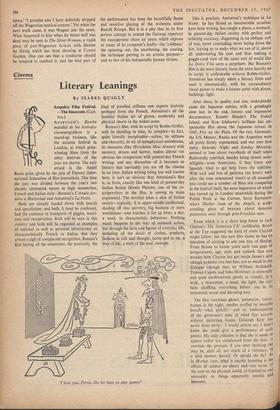Cinema
Literary Leanings
By ISABEL QUIGLY Acapulco Film Festival. The Innocents. (Carl- ton.) Both are already loaded down with laurels and speculation; and both, it must be confessed, had the audience in transports of giggles, weari- ness and exasperation. Both will be seen in this country and both will be regarded as examples of national as well as personal idiosyncrasy so characteristically French or Italian that they arouse a sigh of complacent recognition, Resnais's film having all the ornateness, the preciosity, the love you, Portia. Do we have to play games?' kind of jewelled stiffness one expects (naively perhaps) from the French, Antonioni's all the familiar Italian air of gloom, modernity and physical charm in the widest sense.
Resnais's film, with its script by Robbe-Grillet, with its shuttling in time, its complex—in fact, quite literally inexplicable—action, its stillness and obscurity, its air of metaphysical melodrama, its obsession (like Hiroshima Mon Amour) with memory, dream and horror, makes almost too obvious the comparison with present-day French writing; and any discussion of it becomes so literary that inevitably you are off the cinema in no time. Italian writing being less well known here, it isn't as obvious that Antonioni's film is, in form, exactly like one kind of present-day Italian fiction (Ennio Flaiano, one of his co- scriptwriters in the film, is among its main exponents). The novelist takes a slice of Italian society—typically, it is upper-middle-intellectual, shading off into spivvery, big business or mere worldliness—and watches it for an hour, a day, a week, in characteristic behaviour. Nothing much happens in the way of outward action, but through the facts and figures of everyday life, including all the detail of clothes, artefacts, fashion in talk and thought, tastes and so on, a way of life, a state of the soul, emerges. This is precisely Antonioni's technique in La Notte: he has filmed as innumerable novelists have been writing, has caught a phase, a moment, in present-day Italian society with perfect and sobering accuracy, diagnosing in an oblique sort of way, never concluding, never laying down the law, leaving us to make what we can of it, above all understating his case and thus making a goggle-eyed view of the same sort of world like La Dolce Vita seem a peepshow. But Resnais's film is the more literary, leans the more heavily on its script, is unthinkable without Robbe•Grillet. Antonioni has simply taken a literary form and used it cinematically, with his extraordinary visual power to make a human point with places, buildings, light.
After these, in quality and size, undoubtedly came the Japanese entries, with a grindingly slow but, in the end, intense and impressive documentary, Kaneto Shindo's The Naked Island, and Kon Ichikawa's brilliant but un- speakable film about the Japanese retreat in 1945, Fire on the Plain. Of the rest, Germany, the US, Mexico, Russia and the Argentine were all pretty feebly represented, and our own best entry, Saturday Night and Sunday Morning, seemed to lose about two-thirds of itself when flatfootedly subtitled, besides being almost unin- telligible—even Americans, if they knew any Spanish, tried to get help from the subtitles. With luck and lots of patience (an hour's wait after the time announced wasn't at all unusual) you could see a number of films not competing in the festival itself, the most impressive of which has turned up in London meanwhile during the Polish Week at the Curzon, Jerzy Kawalero- wicz's Mother Joan of the Angels, a scalp- crawling piece of bravura about demonic possession seen through post-Freudian eyes.
From which it is a short leap home to Jack Clayton's The Innocents ('A' certificate). Room at the Top suggested the kind of route Clayton might follow, but this new film shows he has no intention of sticking to any one way of filming. From Braine to James yawn such vast gaps of temperament, age, style and outlook that you wonder how Clayton has got inside James's skin enough to make you feel him, not so much in the dialogue (though that, by William Archibald, Truman Capote and John Mortimer, is extremely and quite unobtrusively good), as visually, in a walk, a movement, a hand, the light, the cur- tains shuffling, everything before you in its mannered, secret and alarming way.
The film combines ghosts, possession, voices, bumps in the night, candles snuffed by invisible breath—what pitfalls!—and an understanding of the governess's state of mind that extends without distorting James. Deborah Kerr has never done better: I would almost say I didn't know she could give a performance of such power. My only criticism is that she is made to appear rather too unbalanced from the first: it unwinds the pressure if you start thinking she may be, after all, too much of a visionary, of a wild woman, herself. Or should she be? As in Mother Joan, what is mainly haunting is the effects of subject on object and vice versa; of the soul on the physical world, of frustration and sensuality on things apparently normal and innocent.


































 Previous page
Previous page